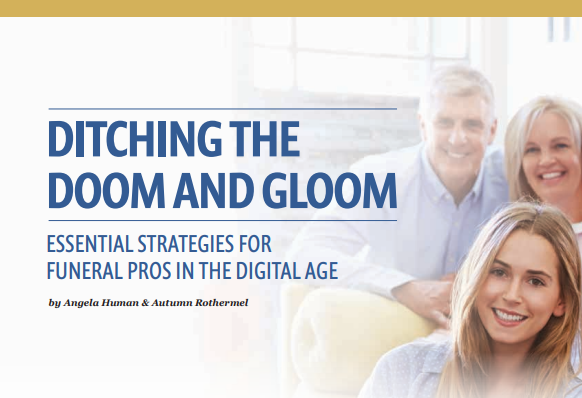(404) 312-6640
Ditching the Doom and Gloom
The funeral industry is undergoing a profound transformation. For generations, funeral homes have relied on traditional marketing approaches, often steeped in somber imagery and a focus on the inevitability of loss. While these elements remain important, today’s families are seeking something more. They crave connection, authenticity, and a celebration of life, not just a somber acknowledgment of death. It’s time for funeral professionals to change the narrative.
This shift requires moving beyond outdated marketing tactics that rely on fear, sadness, and a focus on logistics. Instead, it calls for a new approach that embraces hope, celebrates life, and connects with families on a deeper emotional level. By embracing this new narrative, funeral homes can not only better serve the needs of modern families but also strengthen their businesses and build a lasting legacy of compassion and care.
UNDERSTANDING THE MODERN FAMILY
Today’s families are more diverse and dynamic than ever before. According to a 2023 Pew Research study, 62% of Americans believe that family structures have evolved significantly over the past decade, with blended families, single-parent households, and multi-generational households becoming increasingly common. These families come from various backgrounds, hold different beliefs, and have unique needs and expectations when it comes to funeral services and end-of-life care.
To connect with modern families, funeral homes need to create a welcoming environment for all. This means moving beyond traditional assumptions about family structures and recognizing the diverse relationships people have with the deceased. For example, consider the story of a funeral home in Nashville, Tennessee, that hosted a celebration of life for a beloved high school football coach. The event featured a tailgate-style reception, complete with his favorite barbecue, a slideshow of his championship wins, and a heartfelt speech from his former players. By honoring his unique life and legacy, the funeral home not only provided comfort to his family but also gained recognition for its personalized approach.
Furthermore, modern families are increasingly tech-savvy and digitally connected. A 2022 survey by the National Funeral Directors Association (NFDA) found that 89% of families research funeral homes online before making a decision. Funeral homes need to recognize this shift and adapt their marketing strategies to meet families where they are – online.
THE POWER OF DIGITAL STORYTELLING
Digital platforms offer a powerful opportunity for funeral homes to connect with families in authentic and meaningful ways. By embracing the art of digital storytelling, funeral homes can move beyond traditional marketing messages and create content that resonates with families on an emotional level.
For instance, a funeral home in Charleston, South Carolina, launched a “Southern Legacies” blog series, sharing heartfelt narratives of individuals they had served. One post featured a beloved grandmother known for her famous peach cobbler recipe. The blog included photos of her in her kitchen, the recipe itself, and a video of her family sharing stories about her cooking. The post went viral, garnering over 5,000 shares on social media and leading to a 15% increase in inquiries for personalized memorial services.
Other digital storytelling strategies include:
• Creating interactive memorial websites: Providing families with a dedicated space to share memories, photos, and condolences.
• Using social media to build community: Sharing inspiring stories, offering grief support resources, and facilitating conversations about life, loss, and remembrance.
The key to effective digital storytelling is authenticity and emotional connection. By sharing genuine stories, expressing empathy, and creating a sense of shared experience, funeral homes can build trust with families and establish themselves as compassionate guides during times of grief.
BUILDING A COMMUNITY OF SUPPORT
Funeral homes play a vital role in their communities, not just as providers of funeral services, but also as sources of support and connection for grieving families. By embracing the new narrative, funeral homes can strengthen their role as community pillars and create a lasting impact on the lives of those they serve
Consider the example of a funeral home in Birmingham, Alabama, that partnered with a local church to offer monthly grief support workshops. Participants gathered to share stories, create memory quilts, and enjoy potluck dinners. The workshops became so popular that the funeral home had to expand its space to accommodate the growing number of attendees
Other ways to build community include:
• Offering grief support groups or workshops: Providing a safe space for families to connect with others who are grieving
• Creating online forums or communities: Facilitating online spaces where families can share memories, offer support, and find resources.
• Partnering with local organizations: Collaborating with grief counselors, therapists, local hospice or other community groups to offer additional support.
By fostering a sense of community and providing ongoing support, funeral homes can become a beacon of hope and healing for those navigating the challenges of grief and loss.
MARKETING WITH A HUMAN TOUCH
Marketing in the funeral industry requires a unique approach, one that balances professionalism with genuine compassion. It’s about connecting with families on an emotional level, offering support and guidance, and building trust through transparency and authenticity.
For example, a funeral home in Savannah, Georgia, revamped its website to focus on celebrating life. Instead of featuring generic images of caskets and urns, the homepage showcased vibrant photos of families laughing, hugging, and sharing memories. The site also included a “Meet Our Team” section, where staff members shared personal stories about why they chose to work in the funeral industry. This human-centered approach led to a 25% increase in website inquiries within six months.
Other strategies include:
• Creating marketing materials that focus on celebrating life and honoring legacies:
Moving away from fear-based messaging and embracing a more positive and hopeful tone.
• Using real stories and testimonials to connect with families
Sharing the experiences of those you have served to demonstrate your compassion and expertise.
• Being transparent about pricing and services:
Offering clear and concise information about funeral options and costs to empower families to make informed decisions.
By embracing a human-centered approach to marketing, funeral homes can build stronger relationships with families, enhance their reputation, and ultimately, make a more meaningful impact on the communities they serve.
MEASURING SUCCESS AND ADAPTING TO CHANGE ORGANICALLY
Changing the narrative is an ongoing process that requires continuous evaluation and adaptation. Funeral homes need to track their progress, gather feedback from families, and stay up-to-date with the latest trends and best practices in digital marketing and grief support.
Ways to measure success include:
• Monitoring website traffic and social media engagement:
Tracking how families are interacting with your online content
• Staying informed about industry trends and best practices:
Attending conferences, reading industry publications, and engaging with thought leaders.
• Analyzing family satisfaction survey results
Reviewing collected data to understand family experiences and identify areas for improvement.
• Gathering feedback from online reviews:
Examining online platforms to assess public perception and address concerns raised by families.
By embracing a human-driven and adaptable approach, funeral homes can ensure that their marketing efforts are effective, relevant, and truly serve the needs of families.
THE FUNERAL INDUSTRY IS EVOLVING — ARE YOU?
The funeral industry is evolving, and families are seeking a more personalized, meaningful, and compassionate approach to end-of-life care. By changing the narrative, funeral homes can meet these evolving needs and create a more human-centered experience for the families they serve.
This shift requires a willingness to embrace new ideas, challenge traditional approaches, and prioritize genuine connection and compassion. By focusing on celebrating life, honoring legacies, and providing meaningful support, funeral homes can play a vital role in helping families navigate grief, find healing, and create lasting memories.
The new narrative is not just about changing your marketing; it’s about transforming the way you connect with families and serve your community. It’s about embracing a more holistic and human-centered approach to funeral service that honors life, embraces hope, and fosters lasting connections.






Comments